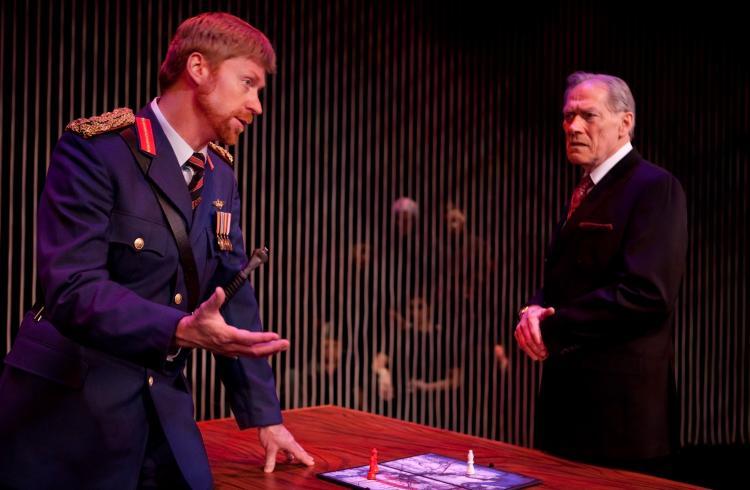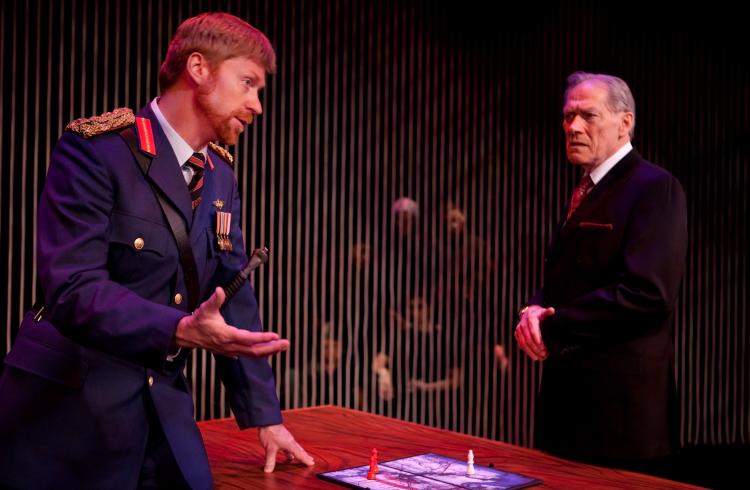Serendipity ruled my weekend, but it was lucky chance of a painful kind.
On Saturday, I was called out to a recording studio in Mississauga by a Congolese friend, Ado Makuntima, to hear some music he was going to post on YouTube. He spoke with urgency, and I listened. Six million people have been killed in the ongoing conflict in the Democratic Republic of Congo; many victims are women and children. The favoured weapon of war? Rape.
As engineer Orin Isaacs (former musical director of Canadian Idol) cued up the music, Ado placed a pile of articles four inches thick on my lap and I began to read. I lasted about 10 minutes, stopping when I came to the detailed descriptions of Congolese women chopped between their legs with machetes, bodies lit on fire, tied to sticks.
Doctors Without Borders in Congo are busy sewing up “fistula,” a condition that happens when the walls between the vagina, bladder, and rectum are destroyed, causing women to have a constant infection and a telltale smell that adds to already unbearable social stigma.
This is not a civil war by any means. When Congo became a hiding place for Hutu “crazy men” who had yet to face retribution for the 1994 genocides, Rwanda, Burundi, and Uganda sent in troops and installed Laurent Kabila. The relationship with Kabila did not last, and when things went wrong he turned to Angola, Namibia, and Zimbabwe to get the Rwandese, Burundians, and Ugandans out. There is no push for justice here. Congo is one of the earth’s richest sources of pretty much everything. Not only are its rainforests the planet’s second lung, it also has rich deposits of uranium, diamonds, gold, cobalt, copper, niobium, tantalum, petroleum, silver, zinc, manganese, and tin. Going to war in Congo gives you access to these minerals, and the money is big.
Naturally, everybody with arms in the region is more than happy to come to Congo. So Congo is being looted. Even if a country like Rwanda officially pulls out, its mining companies were still there in 2003, making it onto the UN’s naughty list. All of these armies, stranded militias, and Congolese rebel groups use gang rape and insertion of painful objects into women regularly.
So that was my Saturday. On Sunday I went to see Erin Shields’ play If We Were Birds. Shields’ writing is sometimes beautiful, but more often chilling and truthful. The play is powerful, the actors impassioned, the direction was carefully organized—the kind of craftsmanship that makes the director invisible, because the story is served faithfully. There were few artificial moments. The principals were excellent, and they delivered an honest and deeply felt performance. It was riveting, quick-paced and thankfully, only one act long. Some people may have wanted to leave. Some people did.
Birds is a carefully constructed Greek tragedy based on the tragic tale of sisters Procne and Philomela. To reward Tereus of Thrace for his great help in war, their father Pandion gives Tereus his oldest daughter, Procne. Tereus takes Procne back to Thrace but she misses her sister terribly and convinces Tereus to go back to Athens and return with her sister Philomela. When Tereus sees Philomela, he is smitten. He eventually rapes Philomela and cuts out her tongue, hiding her in a cabin deep in the woods.
Shields’ Greek chorus consists of rape victims from some of the darkest moments of the 20th century. Philomela’s cabin prison becomes one of “those rooms” like the rooms women have been kept in and used for repeated acts of sexual violence by soldiers in genocides like Rwanda or Nazi Germany. Each chorus member tells her story, each character a victim of a 20th century nightmare.
The men are treated compassionately and carefully. It is made clear that this cycle of brutality is not a feminist issue, but a human one. There are two powerful exchanges between Tereus and Pandion that are subtly cloaked. I won’t spoil them for you, but they mock our western naïveté and point squarely at our complicity.
There is something missing though. Which archetypal Greek character can represent the corporate interests that have made massive profits from these genocides? A gentle reminder to turn off my cell phone during the performance triggered a thought. It is we, the audience, hiding behind the fourth wall. The minerals from Congo are in our cell phones, computers, Gameboys and microwave ovens. We buy them cheap from the factories in China. And we are Canadians.
Did you know that mining companies registered in Canada have been multiplying their assets in the Congo since the conflict began? Assets held by Canadian mining companies in Africa are estimated to be around $20 billion. Canadian company Barrick Gold is seeking to legally stop publication of the book “Imperial Canada Inc.: Legal Haven of Choice for the World’s Mining Industries” by Alain Deneault.
The book not only talks about the alleged pillage of Africa by Canadian mining companies like Kinross Gold, Emaxon, Banro, First Quantum Minerals, and AMFI, but also details how Canada’s opportunistic laws allow these companies to register as Canadian with insufficient monitoring of their actions abroad. Deneault, whose book relates to “Noir Canada,” his previous work on the subject published in French, claims these companies know they are financing armed conflict.
Do you suppose the couple who left the theatre complaining that If We Were Birds had “too much violence” has examined their retirement portfolio to be sure it doesn’t include companies involved in similar actions?
To Erin Shields I say this: When the show is remounted, take out the lovely bird poetry from inside the playbill and put in a request for donations to Doctors Without Borders who have clinics that help rape victims all over the world. Those who want to help Alain Deneault get his book published can sign a petition at http://slapp.ecosociete.org/en/. Ask your financial planner to look at where, and with what companies, your investments are held.
We are addicted to TV and its happy endings. Let action become the happy ending of this play. You only have a couple more days to see it at the Tarragon, and I suggest you do. We in the west may be inadvertent participants in genocide, but we are not tongueless Philomelas.
On Saturday, I was called out to a recording studio in Mississauga by a Congolese friend, Ado Makuntima, to hear some music he was going to post on YouTube. He spoke with urgency, and I listened. Six million people have been killed in the ongoing conflict in the Democratic Republic of Congo; many victims are women and children. The favoured weapon of war? Rape.
As engineer Orin Isaacs (former musical director of Canadian Idol) cued up the music, Ado placed a pile of articles four inches thick on my lap and I began to read. I lasted about 10 minutes, stopping when I came to the detailed descriptions of Congolese women chopped between their legs with machetes, bodies lit on fire, tied to sticks.
Doctors Without Borders in Congo are busy sewing up “fistula,” a condition that happens when the walls between the vagina, bladder, and rectum are destroyed, causing women to have a constant infection and a telltale smell that adds to already unbearable social stigma.
This is not a civil war by any means. When Congo became a hiding place for Hutu “crazy men” who had yet to face retribution for the 1994 genocides, Rwanda, Burundi, and Uganda sent in troops and installed Laurent Kabila. The relationship with Kabila did not last, and when things went wrong he turned to Angola, Namibia, and Zimbabwe to get the Rwandese, Burundians, and Ugandans out. There is no push for justice here. Congo is one of the earth’s richest sources of pretty much everything. Not only are its rainforests the planet’s second lung, it also has rich deposits of uranium, diamonds, gold, cobalt, copper, niobium, tantalum, petroleum, silver, zinc, manganese, and tin. Going to war in Congo gives you access to these minerals, and the money is big.
Naturally, everybody with arms in the region is more than happy to come to Congo. So Congo is being looted. Even if a country like Rwanda officially pulls out, its mining companies were still there in 2003, making it onto the UN’s naughty list. All of these armies, stranded militias, and Congolese rebel groups use gang rape and insertion of painful objects into women regularly.
So that was my Saturday. On Sunday I went to see Erin Shields’ play If We Were Birds. Shields’ writing is sometimes beautiful, but more often chilling and truthful. The play is powerful, the actors impassioned, the direction was carefully organized—the kind of craftsmanship that makes the director invisible, because the story is served faithfully. There were few artificial moments. The principals were excellent, and they delivered an honest and deeply felt performance. It was riveting, quick-paced and thankfully, only one act long. Some people may have wanted to leave. Some people did.
Birds is a carefully constructed Greek tragedy based on the tragic tale of sisters Procne and Philomela. To reward Tereus of Thrace for his great help in war, their father Pandion gives Tereus his oldest daughter, Procne. Tereus takes Procne back to Thrace but she misses her sister terribly and convinces Tereus to go back to Athens and return with her sister Philomela. When Tereus sees Philomela, he is smitten. He eventually rapes Philomela and cuts out her tongue, hiding her in a cabin deep in the woods.
Shields’ Greek chorus consists of rape victims from some of the darkest moments of the 20th century. Philomela’s cabin prison becomes one of “those rooms” like the rooms women have been kept in and used for repeated acts of sexual violence by soldiers in genocides like Rwanda or Nazi Germany. Each chorus member tells her story, each character a victim of a 20th century nightmare.
The men are treated compassionately and carefully. It is made clear that this cycle of brutality is not a feminist issue, but a human one. There are two powerful exchanges between Tereus and Pandion that are subtly cloaked. I won’t spoil them for you, but they mock our western naïveté and point squarely at our complicity.
There is something missing though. Which archetypal Greek character can represent the corporate interests that have made massive profits from these genocides? A gentle reminder to turn off my cell phone during the performance triggered a thought. It is we, the audience, hiding behind the fourth wall. The minerals from Congo are in our cell phones, computers, Gameboys and microwave ovens. We buy them cheap from the factories in China. And we are Canadians.
Did you know that mining companies registered in Canada have been multiplying their assets in the Congo since the conflict began? Assets held by Canadian mining companies in Africa are estimated to be around $20 billion. Canadian company Barrick Gold is seeking to legally stop publication of the book “Imperial Canada Inc.: Legal Haven of Choice for the World’s Mining Industries” by Alain Deneault.
The book not only talks about the alleged pillage of Africa by Canadian mining companies like Kinross Gold, Emaxon, Banro, First Quantum Minerals, and AMFI, but also details how Canada’s opportunistic laws allow these companies to register as Canadian with insufficient monitoring of their actions abroad. Deneault, whose book relates to “Noir Canada,” his previous work on the subject published in French, claims these companies know they are financing armed conflict.
Do you suppose the couple who left the theatre complaining that If We Were Birds had “too much violence” has examined their retirement portfolio to be sure it doesn’t include companies involved in similar actions?
To Erin Shields I say this: When the show is remounted, take out the lovely bird poetry from inside the playbill and put in a request for donations to Doctors Without Borders who have clinics that help rape victims all over the world. Those who want to help Alain Deneault get his book published can sign a petition at http://slapp.ecosociete.org/en/. Ask your financial planner to look at where, and with what companies, your investments are held.
We are addicted to TV and its happy endings. Let action become the happy ending of this play. You only have a couple more days to see it at the Tarragon, and I suggest you do. We in the west may be inadvertent participants in genocide, but we are not tongueless Philomelas.







